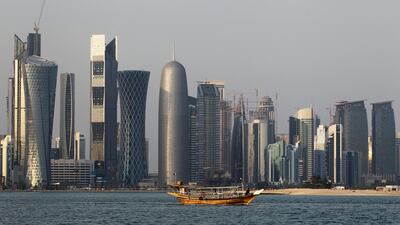Qatar's economy may be hit harder if GCC countries that are in a dispute with their neighbour pull deposits from lenders in Doha as has been suggested amid an escalation of a war of words.
Banks in the Arabian Gulf country have one of the highest advances to deposits ratios in the region and any further pressure on deposits would crimp the ability of banks to lend to companies that need cash to fund their businesses.
Analysts said that Qatari banks could tap funding from banks outside of the region to help it weather a financial storm, but dangers still lurk.
"If banks in the region were to withdraw deposits with Qatar banks, the Qatar banking system would become even more illiquid," said Sanyalaksna Manibhandu, the head of research at NBAD Securities.
"I see any further stress in the Qatar bank system as a lever to get Qatar to yield to its neighbours’ demands."
Mr Manibhandu noted the Qatar interbank rate had spiked since the standoff began.
The possibility of GCC countries withdrawing money has been seen as a possibility since the beginning of the crisis erupted on June 5. The UAE, Saudi Arabia, Bahrain and Egypt broke diplomatic ties with Qatar and cut off air, sea and land access to the country over Doha's support for "terrorist groups aiming to destabilise the region". The dispute is the most serious between GCC members since the organisation's creation in 1981.
The rating agency Moody's Investors Service said the rift between a number of GCC countries and Qatar could be damaging to Qatar if other GCC countries pull out money from Qatari banks, forcing it to borrow money at higher costs.
The row between Qatar and the four Arab countries may also dent business confidence and hit credit growth opportunities in the region if it persists, Moody's said.
Qatar finance minister Ali Shareef Al Emadi told CNN that his country's banking system was stable and had ample reserves of cash.
Chiro Ghosh, the manager of research at Securities & Investment Co in Bahrain, estimated that Qatari banks have borrowed about 60 billion riyals (Dh60.53bn) from the GCC. That represents about 10 per cent of deposits in the banking sector, according to statistics from the central bank of Qatar.
While that might not be a massive percentage of total deposits, the GCC pulling money out of Qatar might create panic, analysts say.
"Qatar is highly dependent on foreign deposits and if these are withdrawn, there is a risk that the currency peg to the US dollar will be broken, creating financial instability and greater uncertainty," said Amy McAlister, an analyst at Oxford Economics.
Perhaps concern about the fortunes of the Qatari economy have been best expressed in the fluctuation of the currency in the forwards market as well as the stocks market. Since the spat flared, Qatari stocks have tanked with the country's benchmark index shedding almost 10 per cent of its value.
Still, observers note that on the stock market front the level of participation of GCC investors is not huge.
“The current ownership of Qatar equities by other GCC investors is quite low, under 1 per cent of the largest 10 stocks which in aggregate make up 80 per cent of the QE (Qatar Exchange) Index," said Hasnain Malik, the head of Equity Research at Exotix.
"The sell down of these remaining positions, in itself, would not have a major impact.”
mkassem@thenational.ae
dalsaadi@thenational.ae

